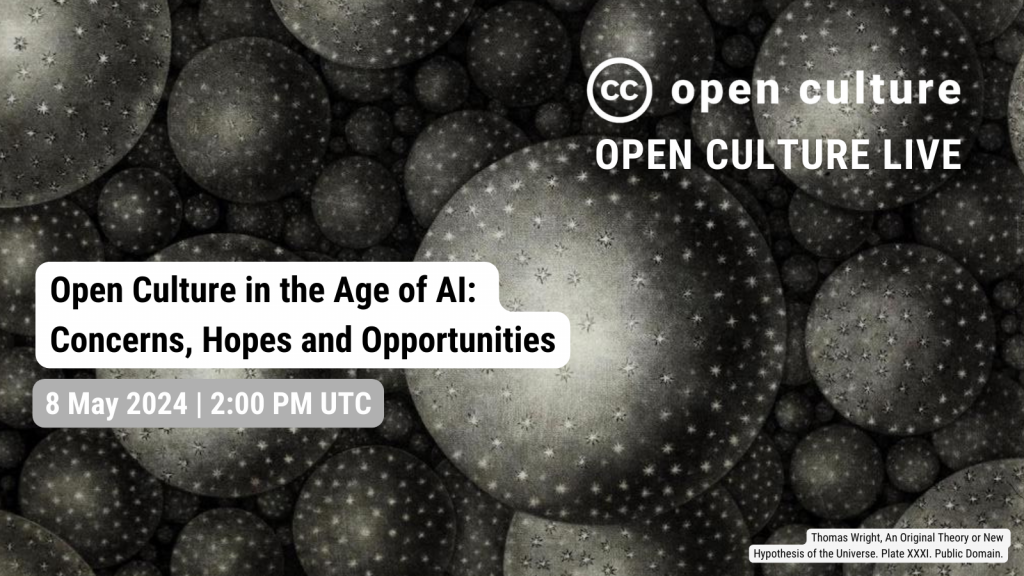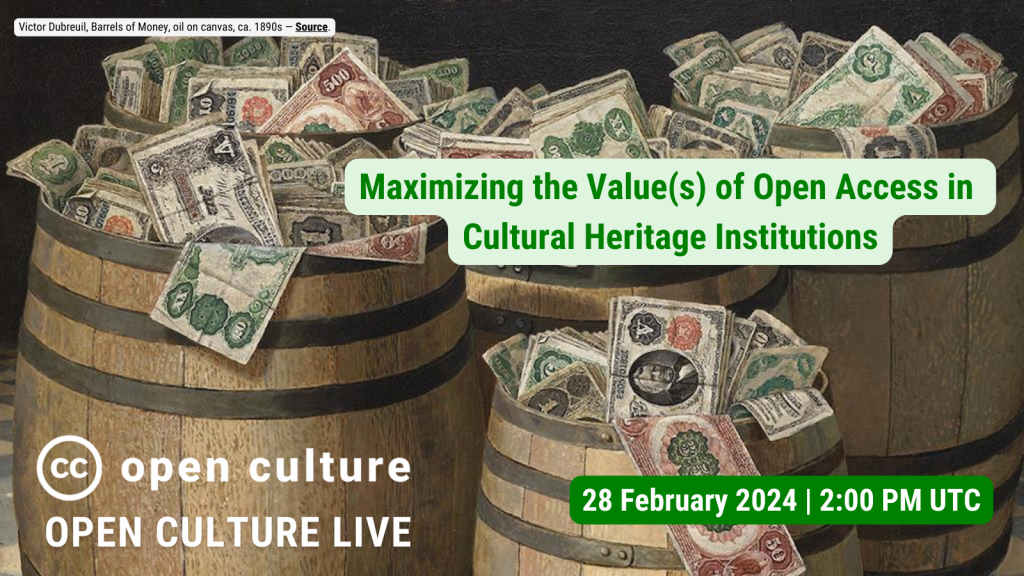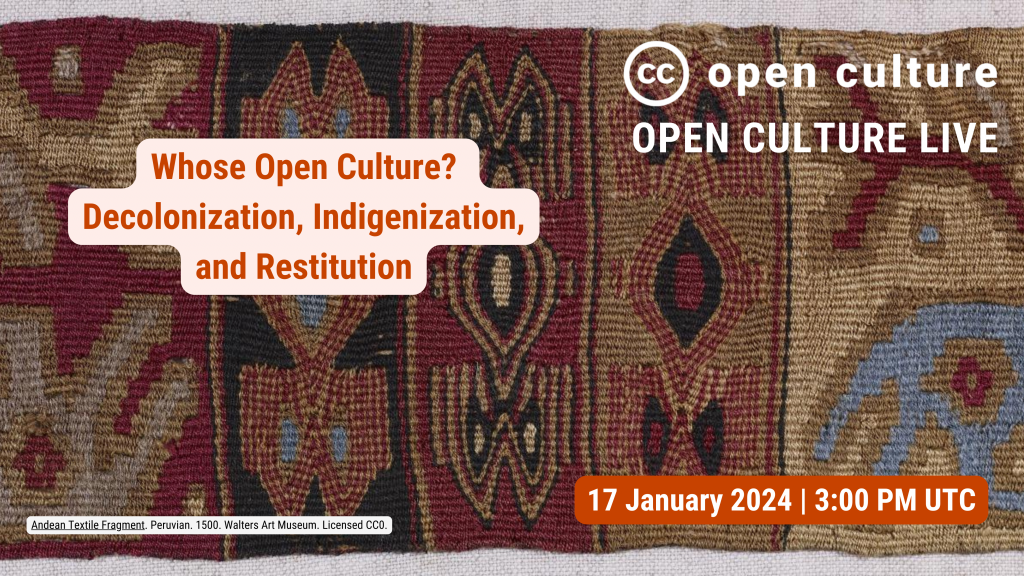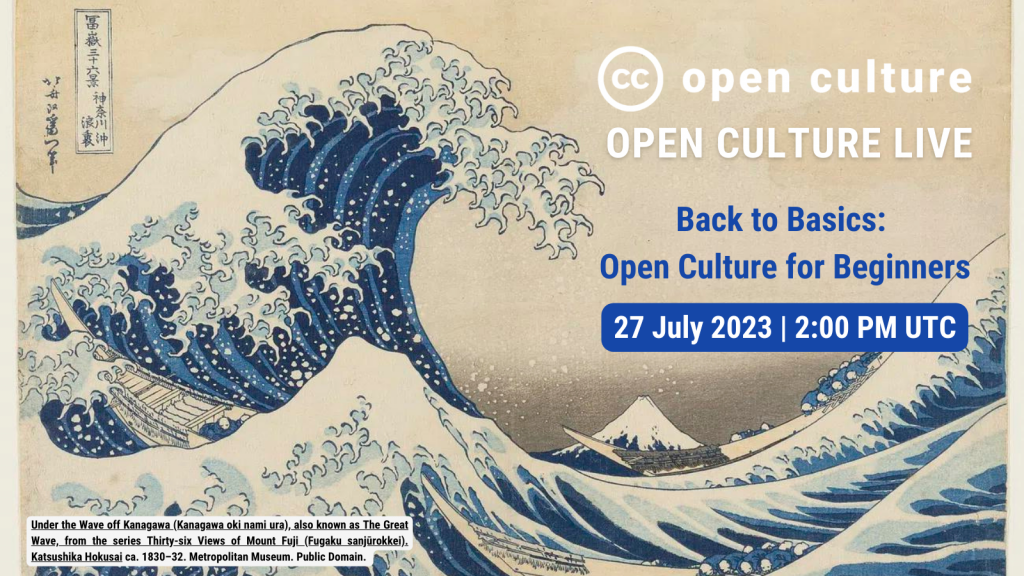There are too few nonprofit organizations like CC fighting for the commons – support our vital leadership with an end of year contribution. Donate today!
Tag: open culture live
Recap & Recording: “Open Culture in the Age of AI: Concerns, Hopes and Opportunities”
by Brigitte Vézina, Connor Benedict, Jocelyn Miyara Open Culture, Open Heritage “ An Original Theory or New Hypothesis of the Universe. Plate XXXI. ”. By Thomas Wright. Public Domain
“ An Original Theory or New Hypothesis of the Universe. Plate XXXI. ”. By Thomas Wright. Public Domain
In May, CC’s Open Culture Program hosted a new webinar in our Open Culture Live series titled “Open Culture in the Age of AI: Concerns, Hopes and Opportunities.” In this blog post we share key takeaways and a link to the recording.
Webinar: Open Culture in the Age of AI: Concerns, Hopes and Opportunities
by Brigitte Vézina, Jocelyn Miyara, Connor Benedict Open Culture “ An Original Theory or New Hypothesis of the Universe. Plate XXXI. ”. By Thomas Wright. Public Domain
“ An Original Theory or New Hypothesis of the Universe. Plate XXXI. ”. By Thomas Wright. Public Domain
On Wednesday, 8 May 2024, at 2:00 pm UTC, CC’s Open Culture Program will be hosting a new webinar in our Open Culture Live series titled “Open Culture in the Age of AI: Concerns, Hopes and Opportunities.”
Recap & Recording: Maximizing the Value(s) of Open Access in Cultural Heritage Institutions
by Brigitte Vézina, Jocelyn Miyara, Connor Benedict Uncategorized “Barrels of Money” by Victor Dubreuil. 1890s. Brandywine Museum of Art , Public Domain.
“Barrels of Money” by Victor Dubreuil. 1890s. Brandywine Museum of Art , Public Domain.
In February, we hosted a webinar in our Open Culture Live series titled “Maximizing the Value(s) of Open Access in Cultural Heritage Institutions.” In this blog post, we summarize the key points raised in the discussion and share a link to the recording.
Upcoming Open Culture Live Webinar: “Maximizing the Value(s) of Open Access in Cultural Heritage Institutions”
by Brigitte Vézina, Jocelyn Miyara, Connor Benedict Open Culture “Barrels of Money” by Victor Dubreuil. 1890s. Brandywine Museum of Art , Public Domain.
“Barrels of Money” by Victor Dubreuil. 1890s. Brandywine Museum of Art , Public Domain.
On Wednesday, 28 February 2024, at 2:00 pm UTC, CC’s Open Culture Program will be hosting a new webinar in our Open Culture Live series titled “Maximizing the Value(s) of Open Access in Cultural Heritage Institutions.”
Recap & Recording: “Whose Open Culture? Decolonization, Indigenization, and Restitution”
by Jocelyn Miyara, Brigitte Vézina, Connor Benedict Open Culture “Andean Textile Fragment” by Peruvian. 1500. Walters Art Museum., here slightly cropped, is released into the public domain under CC0.
“Andean Textile Fragment” by Peruvian. 1500. Walters Art Museum., here slightly cropped, is released into the public domain under CC0.
In January we hosted a webinar titled “Whose Open Culture? Decolonization, Indigenization, and Restitution” discussing the intersection of indigenous knowledge and open sharing. Our conversation spanned a variety of topics regarding indigenous sovereignty over culture, respectful terminology, and the legacy of colonialism and how it still exists today.
Upcoming Open Culture Live Webinar: “Whose Open Culture? Decolonization, Indigenization, and Restitution”
by Jocelyn Miyara, Brigitte Vézina Open Culture “Andean Textile Fragment” by Peruvian. 1500. Walters Art Museum., here slightly cropped, is released into the public domain under CC0.
“Andean Textile Fragment” by Peruvian. 1500. Walters Art Museum., here slightly cropped, is released into the public domain under CC0.
On Wednesday, 17 January, 2024, at 3:00 pm UTC, CC’s Open Culture Program will be hosting a new webinar in our Open Culture Live series titled “Whose Open Culture? Decolonization, Indigenization, and Restitution.” As we observed a few years ago, there is growing awareness in the open culture movement about issues related to the acquisition, preservation, access, sharing, and reuse of cultural heritage of Indigenous peoples and local communities (including traditional knowledge and traditional cultural expressions), heritage in the context of colonization, and culturally-sensitive heritage.
Open Culture Live Recap & Recording: Respectful Terminologies & Changing the Subject
by Jocelyn Miyara, Brigitte Vézina Open Culture “Princesses Gather at Fountain”, ca. 1770, shown slightly cropped. The Metropolitan Museum of Art. Public Domain.
“Princesses Gather at Fountain”, ca. 1770, shown slightly cropped. The Metropolitan Museum of Art. Public Domain.
On 22 November, we organized a webinar with a group of experts to discuss their unique approaches to reparative metadata practices: considering the ways that harmful histories and terminologies have made their way into collections labeling and categorization practices and finding ways to identify those terms, contextualize them, and/or replace them altogether. Jill Baron, a…
Open Culture Live Webinar: Changing the Subject & Respectful Terminologies
by Brigitte Vézina, Jocelyn Miyara Open Culture “Princesses Gather at Fountain”, ca. 1770, shown slightly cropped. The Metropolitan Museum of Art. Public Domain.
“Princesses Gather at Fountain”, ca. 1770, shown slightly cropped. The Metropolitan Museum of Art. Public Domain.
For centuries, cultural heritage institutions have been undertaking the work to document and catalog objects in their collections — sometimes this work suffers from a legacy of colonialism and discrimination in the way their collections are labeled and categorized. Some institutions are working to update these labels with more respectful terminology. Hear more from some of the changemakers working to update labels and metadata with more respectful terminologies during this CC panel.
Back to Basics: Open Culture for Beginners
by Brigitte Vézina, Connor Benedict, Jocelyn Miyara Open Culture Under the Wave off Kanagawa (Kanagawa oki nami ura), also known as The Great Wave, from the series Thirty-six Views of Mount Fuji (Fugaku sanjūrokkei). Katsushika Hokusai ca. 1830–32. Metropolitan Museum. Public Domain.
Under the Wave off Kanagawa (Kanagawa oki nami ura), also known as The Great Wave, from the series Thirty-six Views of Mount Fuji (Fugaku sanjūrokkei). Katsushika Hokusai ca. 1830–32. Metropolitan Museum. Public Domain.
On 27 July 2023 we hosted the first webinar in our new Open Culture Live series. In this session about the basics of Open Culture, we led a presentation that answers some of the key questions for beginners hoping to understand more about Creative Commons, and how we work closely with the cultural heritage sector…
Introducing Open Culture Live: A Webinar Series
by Brigitte Vézina, Connor Benedict, Jocelyn Miyara Open Culture Under the Wave off Kanagawa (Kanagawa oki nami ura), also known as The Great Wave, from the series Thirty-six Views of Mount Fuji (Fugaku sanjūrokkei). Katsushika Hokusai ca. 1830–32. Metropolitan Museum. Public Domain.
Under the Wave off Kanagawa (Kanagawa oki nami ura), also known as The Great Wave, from the series Thirty-six Views of Mount Fuji (Fugaku sanjūrokkei). Katsushika Hokusai ca. 1830–32. Metropolitan Museum. Public Domain.
The CC Open Culture Team is excited to announce a new webinar series, Open Culture Live. This series will feature conversations with experts on a number of topics, from the basics of open culture to discussions about traditional knowledge, artificial intelligence, respectful terminologies in collections, and more. As a first session, we wanted to introduce…